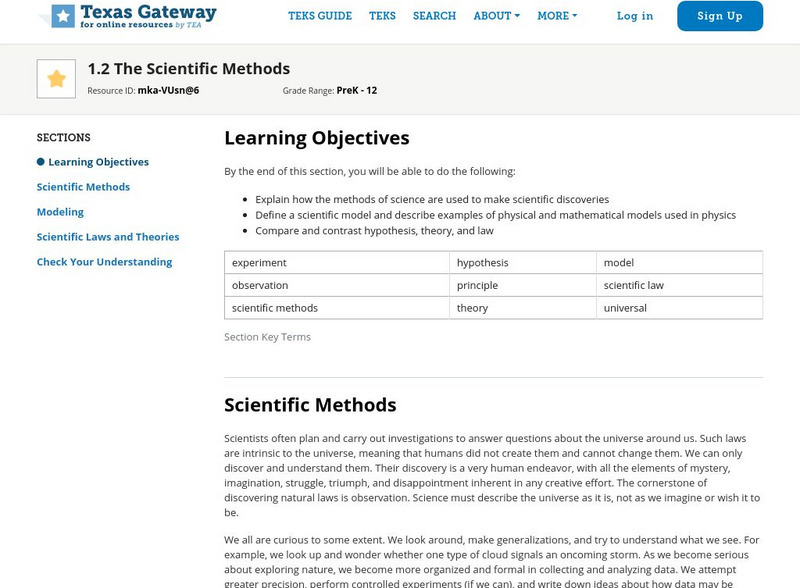Hi, what do you want to do?
Curated OER
Machines: Useful But Dangerous
First graders study, observe, and use a simple machine. They study necessary safety and review posted safety rules related to using a machine and identify strategies for reporting any accidents or injuries.
Curated OER
Simple Machines
Fifth graders study how simple machines can help us alter forces and discuss the term mechanical advantage. They then identify dysfunctional simple machines and discuss in groups how the dysfunctions will decrease the effectiveness of each.
Curated OER
Plants
First graders explore the specific needs, characteristics, and uses of plants. They discuss the needs of plants as they grow. Students observe plants in various settings as they grow and note the changes they see.
Curated OER
Transformation of Energy-8th Grade
Eighth graders examine how electricity is produced in relation to the atom as well as what causes electric current to flow and what determines how much current flows through a circuit. These and other concepts of transformation of energy...
Curated OER
Transforming Energy
Sixth graders study about alternate energy sources and discuss with their neighbor how alternative energy sources affect environmental conditions so that an entire species could be affected.
Curated OER
Looking into Earth with GIS
Students work with data from a seismic wave model in a freely available GIS (geographic information system) program, ArcVoyager SE. Using a GIS, they examine maps and produce graphs to explore variations in seismic wave velocities at...
Curated OER
Weather Mobile
Students color the lightning part of the thunder cloud and then cut out the pattern. They then cut out the cloud pattern and put cotton onto it with glue. They then fold a piece of paper several times to create a snowflake to which they...
Curated OER
Using several learning modalities to teach about the Periodic Table.
Students identify how to relate the position of an element in the periodic table to its atomic number and atomic mass. They identify how to use the periodic table to identify metals, semimetals, nonmetals, and halogens, and also,...
Curated OER
Windsor Opposes Waste - WOW!
Students participate in paper recycling. They are taught to environmental awareness of recycling and its importance in their future. Students discuss and identify the problems of how they can minimize waste. They brainstorm suggestions...
Curated OER
Coping With War: Diversions in a Century of Global Conflict
Eleventh graders analyze photographs representing leisure and transition during a global conflict. Working in groups, 11th graders review pictures from a web exhibit. The group completes a graphic organizer analyzing the photograph for...
Curated OER
Introduction to Computing and Project Development
Students use a computer and math to complete a science project. They review a brief history of computers as well as information on different operating formats will be included. In addition, students complete an overview of the hardware...
Curated OER
Converting Metric Units and Prefixes
Students investigate the length of various objects. In this measurement instructional activity, students convert one metric unit to another. They explain the importance of a uniform system of measurement.
Curated OER
NOAA Research Project
Students research any topic relating to the National Oceanic and Atmospheric Administration (NOAA) research cruise that Mrs. Richards be participating in.
Curated OER
North Dakota Plants with Lewis and Clark
Tenth graders identify native plants of North Dakota. They compare the plants found on native prairie with the plants described in the Lewis and Clark journals. They present the information they have collected in an electronic format...
Curated OER
Adventuring in the Archipelago
Students study Charles Darwin's voyage on the HMS Beagle and his visit to the Gal??pagos Islands. They click through an interactive map of the Gal??pagos Islands to read actual and fictional journal entries from a fellow eco-tourist.
Curated OER
Global Change — Change and Cycles Where Land, Air and Water Meet
Students participate in an experiment to define a parts-per-billion solution. In this ecology lesson, students select a second substance to create a parts-per-billion solution and observe and record their results. Students work in groups...
CK-12 Foundation
Ck 12: Life Science: Scientific Theories
[Free Registration/Login may be required to access all resource tools.] Today most people realize that microorganisms, such as bacteria or viruses, are the cause of disease. This concept is known as the germ theory of disease, one of the...
CK-12 Foundation
Ck 12: Biology: Scientific Theories
[Free Registration/Login may be required to access all resource tools.] Covers scientific theory and scientific laws.
CK-12 Foundation
Ck 12: Biology: Scientific Theories
[Free Registration/Login may be required to access all resource tools.] Explains scientific theories and introduces several famous theories in biology.
CK-12 Foundation
Ck 12: Physical Science: Scientific Theory
[Free Registration/Login may be required to access all resource tools.] Nature of scientific theories, examples of physical science theories, and the law of parsimony.
CK-12 Foundation
Ck 12: Scientific Theories
[Free Registration/Login may be required to access all resource tools.] Students will understand the difference between theories, hypotheses, and laws in science.
Texas Education Agency
Texas Gateway: Theories
Given laboratory investigation scenarios, students will distinguish between scientific hypotheses and scientific theories.
Other
Astronomy Notes: A Scientific Theory Is . . .
This brief review explains that a scientific theory comes from testing an idea.
Texas Education Agency
Texas Gateway: Physics: The Scientific Methods
By the end of this section, you will be able to explain how the methods of science are used to make scientific discoveries; define a scientific model and describe examples of physical and mathematical models used in physics; and compare...




























